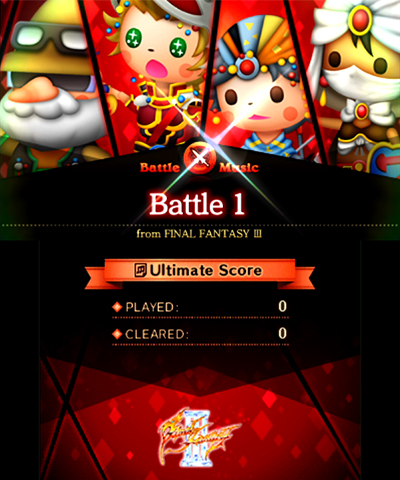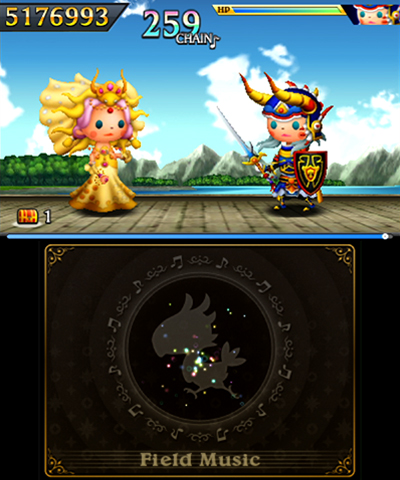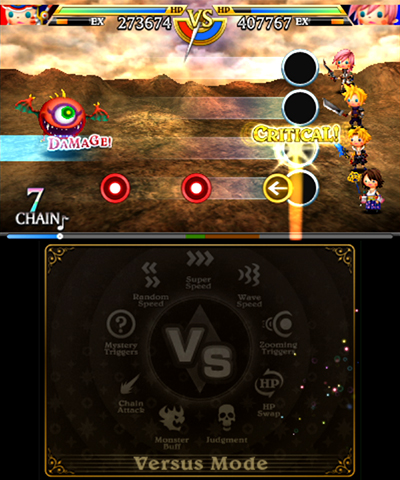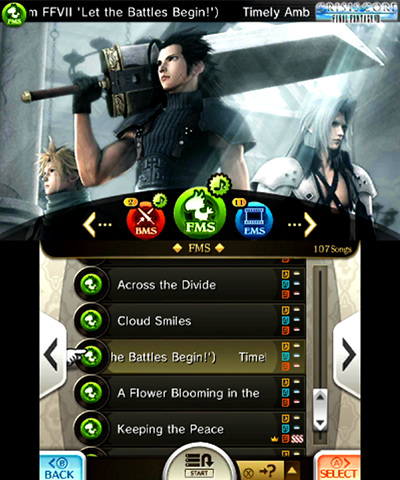Publisher: Square Enix
Developer: Square Enix
Medium: Cartridge
Players: 1-2
Online: Yes
ESRB: T
Theatrhythm Final Fantasy: Curtain Call marks the second attempt by Square Enix to mesh the frantic tapping mechanics of portable music games with the traditional trappings of their flagship RPG series. And guess what? It totally works again. I found the original to be a charming trip down memory lane, and this second entry provides that exact same warm, fuzzy feeling of nostalgia all over again. But it has a few more bells and whistles to go along with it, making this a step-up from the original Theatrhythm Final Fantasy.
The basic concept from first game is the same in Curtain Call. You?ll build a party of characters culled from various Final Fantasy titles, with fan favorites like Cloud, Squall, Tifa, Rydia, Cecil and others to pick from. You can create a party of four, and tackle a variety of songs from all the mainline Final Fantasy entries to date, including spin-offs like Mystic Quest, Crystal Chronicles, and the more recent Final Fantasy XIII sequels. Even tracks from Type-0 are featured here.
 Songs are presented in three ways. Battle, Field, and Event sequences. Battle pits your four warriors against a series of recognizable enemies also pulled from various games in the series, while each of your party members represent an invisible on-screen line where icons scroll across. You?ll need to tap the screen after each icon passes a certain point, with some minor variations that?ll have you holding the stylus down for extended notes, or swiping in a certain direction instead of just tapping. Successful taps or swipes will damage the opposing enemy, and once wiped out, another will appear. Defeating foes will often net you items or special CollectaCards as loot.
Songs are presented in three ways. Battle, Field, and Event sequences. Battle pits your four warriors against a series of recognizable enemies also pulled from various games in the series, while each of your party members represent an invisible on-screen line where icons scroll across. You?ll need to tap the screen after each icon passes a certain point, with some minor variations that?ll have you holding the stylus down for extended notes, or swiping in a certain direction instead of just tapping. Successful taps or swipes will damage the opposing enemy, and once wiped out, another will appear. Defeating foes will often net you items or special CollectaCards as loot.
Field sequences will feature a single character walking along against the backdrop of familiar Final Fantasy locations, with a singular icon track to following and tap along with. During the Field sequence, scoring critical taps on notes can sometimes cause your characters walking speed to increase, and the farther you walk during Field events the more likely you are to be given items by Moogles. Event sequences feature no characters, but instead have notes to tap against the backdrop of an in-game event, like the FMV sequences found in later Final Fantasy titles.
 Characters in your party will earn experience for every song completed. As they earn experience, they?ll level up, and gain access to special abilities. Like their RPG counterparts, characters like Vivi or Rydia will typically feature magical spells, whereas characters like Cloud or Kain will focus more on melee or strength based attacks. Despite different spell names and attacks, most offensive and defensive abilities tend to do the same thing with varying degrees effectiveness. So outside of characters excelling at stats like agility and strengths, everyone can feel a bit too similar. Granted, they appear different visually, but I wish they stood apart more when it came to their skill set.
Characters in your party will earn experience for every song completed. As they earn experience, they?ll level up, and gain access to special abilities. Like their RPG counterparts, characters like Vivi or Rydia will typically feature magical spells, whereas characters like Cloud or Kain will focus more on melee or strength based attacks. Despite different spell names and attacks, most offensive and defensive abilities tend to do the same thing with varying degrees effectiveness. So outside of characters excelling at stats like agility and strengths, everyone can feel a bit too similar. Granted, they appear different visually, but I wish they stood apart more when it came to their skill set.
Final Fantasy Theatrhythm: Curtain Call features a fair number of modes to check out. You can freely play through any song available from the start of the game, with the Event stages being the only stages required to unlock. Considering Event stages don?t offer a lot of benefits outside of the experience earned, I didn?t care about their initial absence. It?s easy enough to navigate the songs for each series, and every song features three difficulty levels. The medium difficulty, Expert, will likely be your best starting point, while the hardest difficulty, Ultimate, will take a long time to master (unless you?re a rhythm game savant). Also, certain songs are highlighted with daily bonuses, providing extra XP for completing them when marked. And using a character from the game a song is from will net you a bonus too.
 If you?d prefer something more structured, then Quest Medley will be the mode for you. In Quest Medley you?ll be able to navigate a series of small maps with different nodes featuring Battle and Field stages to complete. Quest Medley?s culminate in a boss encounter after a series of stages have been completed, and often serve as the best way of obtaining various colored crystals, which in turn are used to unlock more characters. Every time you complete a Quest Medley, you?ll also unlock a new Medley, often harder than the last. Sometimes you?ll unlock Medley?s that are more likely to provide rare items, and occasionally you?ll earn new Medley?s by trading ProfiCards with other players online or off.
If you?d prefer something more structured, then Quest Medley will be the mode for you. In Quest Medley you?ll be able to navigate a series of small maps with different nodes featuring Battle and Field stages to complete. Quest Medley?s culminate in a boss encounter after a series of stages have been completed, and often serve as the best way of obtaining various colored crystals, which in turn are used to unlock more characters. Every time you complete a Quest Medley, you?ll also unlock a new Medley, often harder than the last. Sometimes you?ll unlock Medley?s that are more likely to provide rare items, and occasionally you?ll earn new Medley?s by trading ProfiCards with other players online or off.
Theatrhythm Final Fantasy: Curtain Call also has a surprisingly fun VS. mode to check out, which allows you to compete against other players locally and online, along with the A.I. Competing against the A.I. through VS. also serves as the best way of obtaining CollectaCards, which offer more incentives this time around than just filling out a virtual binder. CollectaCards can be used to enhance stats on various characters, improving things like HP, Magic, Strength, Agility, Stamina and more. Using a card won?t remove it from your in-game binder, but it will prevent you from using the card again until you find one to replace it.
 VS. mode pits you against your opponent via a musical tug-of-war. You?ll both play the same song at the same time, and for each successful note hit you?ll fill a special meter. Once filled, you?ll automatically unleash a special attack that causes a random negative effect for your opponent. This can throw off the timing of notes, cause directional notes to spin, and even outright deplete your opponent?s health bar. Once the song is finished, the player with the highest point total wins. I didn?t have much opportunity to play online prior to launch, but it?s worth noting that you can play against international players, with an option to select between regional or international play.
VS. mode pits you against your opponent via a musical tug-of-war. You?ll both play the same song at the same time, and for each successful note hit you?ll fill a special meter. Once filled, you?ll automatically unleash a special attack that causes a random negative effect for your opponent. This can throw off the timing of notes, cause directional notes to spin, and even outright deplete your opponent?s health bar. Once the song is finished, the player with the highest point total wins. I didn?t have much opportunity to play online prior to launch, but it?s worth noting that you can play against international players, with an option to select between regional or international play.
All in all, I?m pretty impressed with the overall package of Theatrhythm Final Fantasy: Curtain Call. The actual gameplay provided by tapping along to familiar songs is just challenging enough to remain engaging, and the appeal of leveling up characters, unlocking new abilities, and earning more characters to play with keeps you coming back for more. There?s certainly an addictive nature to the game that is hard to deny. Sure, the appeal is significantly lessened if you have no affinity for the Final Fantasy brand or history, but I?d also be willing to bet there?s a very small number of people that haven?t enjoyed a few FF games in their lifetime. I?d certainly suggest checking it out when it hits store shelves and the eShop on September 16th.

